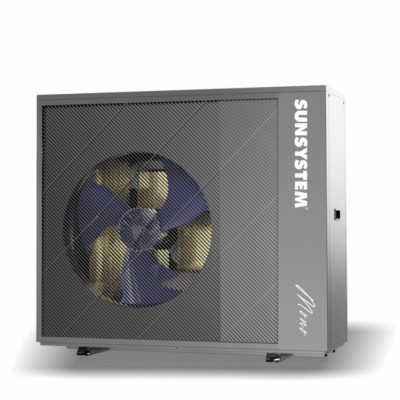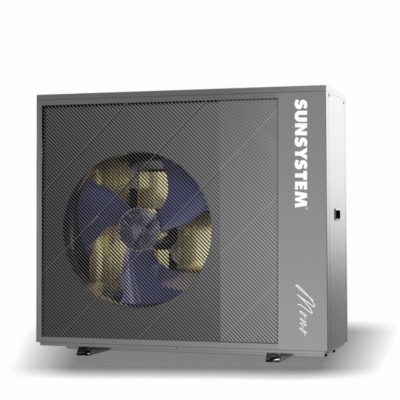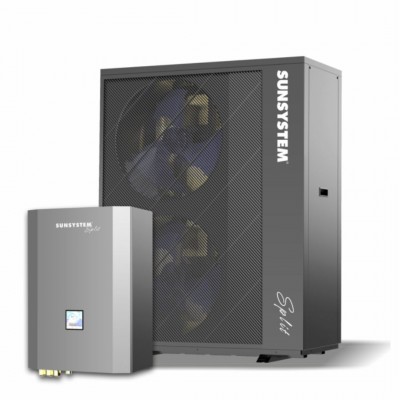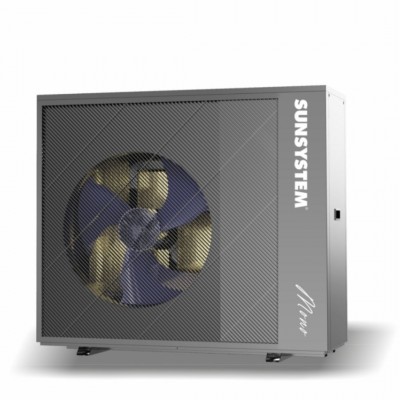Heat Pumps
Heat pumps utilize thermal energy from the environment to heat or cool your home. They offer high energy efficiency and can significantly reduce heating costs.

Heat pumps are an innovative way for economical and efficient heating and cooling domestic and administrative buildings. Heat pumps can be classified as a renewable source of energy since they use endless resources such as air, water and land. This is a modern and ecological solution that cares about human needs and protects the environment.
Heat pumps are one of the least common yet most efficient way to heat or cool. Heat pumps are closed circuits that use free energy from the environment and almost no cost to maintain and use and the electrical consumption is minimal due to it being used only to transport heat from one place to another. Even though they have higher initial investment in long terms heat pumps have much lower energy consumption compared to every other type of system. Heat pump energy efficiency is of the highest class.
Another advantage is that heat pumps are fully automatic, compact, reliable, safe and easy to use. They provide complex and year-round heating, cooling and domestic hot water production.
To evaluate the efficiency and choose between different types of heat pumps, two coefficients are used:
-
COP - Coefficient of Performance that shows the ratio between the heat output and the consumed electricity. Higher COP value means more efficient heat pump.
-
EER – Energy Efficiency Ratio showing the same ration but in cooling mode.
According to EU regulation 206/2012 these old coefficients were replaced by new ones and manufacturers are required to declare them in the labels.
-
SEER - Seasonal Energy Efficiency Ratio showing the efficiency in cooling mode
-
SCOP - Seasonal Coefficient of Perfomance that shows the ratio between the heat output generated in the heating season and the consumed electricity in the whole season.
Heat pump classification is based on the way they use the natural resources – the heat energy source. The most common types extract heat from the air, from water or from below the ground.
Types of heat pumps
Aerothermal heat pumps
They extract energy from the surrounding air. Their advantage is the relatively low price and high COP, but this coefficient is highly affected by the atmosphere conditions and is changing depending on the external temperature. Aerothermal heat pumps don’t heat evenly the rooms due to the air circulation and can be noisy.
-
Air to air heat pumps: it’s made of two separate ventilator sections (external and internal). Works the same way as an air conditioner and can be monoblock or split system. This type of heat pumps has 10% to 30% lower SCOP compared to the other types. In the winter period due to the lower temperatures it’s possible to form air on the evaporator surface.
-
Air to water heat pumps: also known as chillers. They are comprised of an external heat exchanger (evaporator) that is mounted outside and an internal heat exchanger (condenser). They work the same way as a refrigerator by transforming low-temperature energy of the outside air to high-temperature energy for heating and domestic purposes.
Depending on the maximum temperature of the water circulating in the installation, air to water heat pumps can be:
-
Low temperature heat pumps (water temperature up to 60 °С)
-
High temperature heat pumps (temperature up to 80 °С).
Depending on how they are made, these heat pumps can be:
-
Split type low temperature heat pumps. These heat pumps have an external body (where the compressor is installed) and an internal body (hydrobox). Connection between the two parts is made with freon flowing through pipes.
-
Monoblock low temperature heat pumps. This type doesn’t have an internal body which is their greatest advantage. These heat pumps heat the water in the outside body which is directly connected to the central heating system of the building. Thys type of heat pumps have lower initial investment, great efficiency, they are safe and have long service life.
The main disadvantage of monoblock heat pumps is that water is circulating outside the building and if temperatures are very low (and the heat pump doesn’t have safeties built-in) the water can freeze. It is recommended using special water solutions, non-stop operation or using an electric heating element to avoid freezing. In countries and areas where temperature doesn’t stay below -20˚С for prolonged periods makes them a very good option.
-
Split type high temperature heat pumps. They are mainly used to connect to existing installations, they can work only in heating mode and can supply domestic hot water throughout the year.
-
Central system heat pumps are used for heating and cooling large buildings and one external body can supply several homes. The advantage is a low number of external bodies and separate internal modules (hydroboxes) for each home.
Hydrothermal heat pumps
They extract heat from underground bodies of water that have a constant temperature of 7°С to 14°С in depths of 20 to 30m. This type of heat pumps have very high energy efficiency, but installing one requires in-depth geothermal survey and possibly a license in order to drill for underground water. In some protected areas it’s prohibited to use hydrothermal heat pumps.
-
Water to air heat pumps: they are comprised of a heat exchanger through which water with ground temperature passes and an internal ventilation system
-
Water to water heat pumps: heat source is underground water or the ground. They have two separate heat exchangers in one body. Through one passes the ground water and the other is connected to the central heating system of the building.
Geothermal heat pumps
They extract heat from the soil or deep below ground. Heat energy in the soil is limitless even with very low atmospheric temperatures. Soil is a very good heat accumulator since its temperature is almost constant all year. Exactly because of this geothermal heat pumps are a very reliable way of heating in cold winter days. Apart from heating your home, you can rely on geothermal installations for cooling it in the summer. The application of heat pumps for cooling for HVAC in the domestic and industrial sector is a good alternative of conventional boiler and chiller systems. The energy saved using geothermal heat pumps can be up to 75%. Practically every heat pump using a valve is capable of reversing the functions of the evaporator and the condenser which means it will supply heat in winter and cold in summer. This type of heat pumps are very efficient and have very short investment return period. Geothermal heat pumps can supply all year domestic hot water with temperatures of up to 60 °С even during summer.
How to Choose the Right Heat Pump?
Choosing a heat pump depends on several factors:
-
Type of energy source (air, water, ground);
-
Climatic conditions;
-
Size of the heated space;
-
Budget for installation and maintenance.
Frequently Asked Questions About Heat Pumps
- How does a heat pump work?
Heat pumps use a compressor and refrigerant to transfer heat from the outside environment into the home. - Can a heat pump be used for cooling?
Yes, some heat pumps have a cooling function for use in the summer. - What is needed for the installation of a geothermal heat pump?
Drilling and installation of pipes in the ground are required. - How long do heat pumps last?
With proper maintenance, they can last 15-20 years or more. - What is COP (Coefficient of Performance)?
It is a measure of the heat pump's efficiency, indicating the ratio of produced to consumed energy. - Can heat pumps completely replace traditional heating systems?
In many cases, yes, they can fully replace conventional heating systems. - How noisy is a heat pump?
Modern heat pumps operate very quietly, but it is always advisable to check the specifications of the specific model. - Can heat pumps be integrated with existing heating systems?
Yes, some models can be combined with existing systems for greater flexibility and efficiency.






.jpg)
